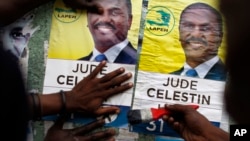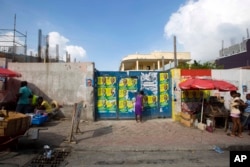Haiti is going ahead with its rescheduled national elections Sunday. Voting was delayed after Hurricane Matthew ravaged the Caribbean state last month.
Six million Haitians are eligible to vote for one of 27 presidential candidates, as well for members of both houses of parliament. Haitian authorities confirmed Friday that voting would go ahead, even though much of the country's southwest is still dealing with serious storm damage.
Long before the hurricane hit, political turmoil had delayed Haiti's vote. A presidential election was held in October 2015, but the results were scrapped because of fraud. Violent protests disrupted parliamentary elections earlier last year, and results were canceled in about a quarter of the districts.
All of those offices are due to be decided Sunday, although runoff votes will be necessary in many cases.
Outright winner unlikely
With so many candidates for president, no one is likely to gain an absolute majority of the vote, or reach a 25 percent plurality over the second-ranking candidate. The top two finishers Sunday will face off January 29, with the winner to be sworn into office for a five-year term eight days later.
Jocelerme Privert, chosen to be Haiti's interim president in February, has remained in power even though his mandate expired five months ago. He is expected to remain in charge of the government until the next president is chosen.
In an address to the nation this week, Privert called on all Haitians to take part in the elections even though conditions are difficult in many areas. "The upcoming elections will be crucial for the democratic future of the country," Privert said.
There is no clear-cut leader among the 27 candidates for president. They include: Jovenel Moise, a plantation owner, chosen by the ruling PHTK ("the Bald Heads Party") and former President Michel Martelly; Jude Celestin of the LAPEH Party, who was runner-up in the 2015 ballot that subsequently was canceled; and Maryse Narcisse, one of two women on the ballot, who was a spokeswoman for former President Jean-Bertrand Aristide. He has endorsed Narcisse and encouraged his supporters to take to the streets in protest if her candidacy fails.
An uncertain future
Political analysts have said the key question for Haiti's future is whether candidates who fail to gain entry to the second round of voting accept the outcome of the political process.
Haiti has long been known as the poorest nation in the Americas, and it is still suffering from a devastating earthquake in early 2010. Thousands of people who lost their homes in the quake are still living in temporary shelters, and the population of Haiti's tent cities has swelled since last month's hurricane. A cholera epidemic that broke out after the earthquake has persisted, and the number of infections rose sharply in recent weeks.
Earlier this month, Haiti began a campaign to immunize more than 800,000 people against cholera. The debilitating and potentially fatal bacterial disease thrives in places where water supplies are unsafe and sanitary conditions are lacking. Cholera had not been a problem in Haiti until it was inadvertently brought to the island by a contingent of U.N. peacekeepers helping with post-earthquake security and reconstruction.
The U.S. State Department has applauded the "significant steps" Haitian authorities have taken to make Sunday's vote possible. However, American citizens traveling to Haiti have been urged to exercise caution, because tensions remain high since the disrupted elections in 2015.






